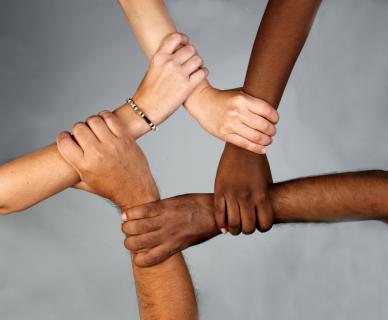
by Genna Kohlhardt
I grew up and went to school in Colorado and Idaho, states not known for their diversity, especially in the late ‘90s and early 2000s. Before the age of 23, I personally knew by name one black person. One. His name was Brandon.
When I moved to Washington, D.C., in my late 20s, into a predominately African American neighborhood, I couldn’t leave my apartment for the first few days without noticing, really consciously noting, every black person I saw. Not because they were a person but because they were a black person. I had never lived anywhere where a person of color wasn’t the person of color. So it wasn’t until my late 20s that I learned there is a difference between a weave and relaxed hair, or that skin lightener is a thing, or that “urban fiction” exists. It wasn’t until my late 20s that I had really considered race, considered how someone’s race might affect their being in the world.
I was in D.C. when a grand jury in Ferguson, Missouri, chose not to indict Darren Wilson for the killing of Michael Brown. Shortly after, Claudia Rankine’s critically acclaimed Citizen came out. Reading Citizen, I felt something safe seep from me. A large portion of the book is made up of lyric essays in response to racist cultural moments, like when Danish tennis star Caroline Wozniacki shoved towels down the front of her top and the back of her skirt to imperso nate Serena Williams. Interspersed through-out is a personal narrative built from everyday experiences of racism.
nate Serena Williams. Interspersed through-out is a personal narrative built from everyday experiences of racism.
The whole book is written in second person. These things happen to you. Some are accidental, some not: a friend perpetually mixes up your name with that of her black housekeeper, a therapist you make an appointment with screams “get away from my house” when you show up at her door. Rankine’s “you” is powerful because she places the effects of modern racism in her reader’s body. For example, in this excerpt, she describes the feeling after a colleague complains that the dean is making them hire a person of color “when there are so many good writers out there”:
When you arrive in your driveway and turn off the car, you remain behind the wheel another ten minutes. You fear the night is being locked in and coded on a cellular level and want time to function as a power wash. Sitting there staring at the closed garage door you are reminded that a friend once told you there exists the medical term—John Henryism—for people exposed to stresses stemming from racism. They achieve themselves to death trying to dodge the buildup of erasure.
While some of the experiences in Citizen seem slight, their cumulative effect is traumatic. I felt exhausted after reading it. But it is more complicated than that. Certainly, Citizen opened up a space in me to start (really, just start) to comprehend what a black person’s experience of race might be like, but it also showed me an ugly image of myself. As a white woman, I saw myself in some of the ignorant things said to the protagonist.
In one particularly hideous moment, I was reading Citizen on the bus while thinking the group of teens that had just got on was really obnoxious. What I was actually thinking, though, was, “Wow, those black kids are loud.” Writing this now, I feel intense shame (and I should). I imagine this shame is common among Rankine’s white readers. We like to read books about lynching and feel good about how evolved we are. One of Rankine’s powers is that she reveals the lie.
Junot Diaz said, “If you want to make a human being into a monster, deny them, at the cultural level, any reflection of themselves.” I think he is right, but I also believe the opposite is true. If you want to make yourself into a monster, only read your own narrative. One of the most vital things literature does for us is to expand our empathy, to make us hear voices of people whose lives are different than our own.
I think of this in a very physical way; no other art form forces you to recite the words of another in your own head. Reading is a deeply intimate act. Nothing breaches the gap between self and other quite that way, and books like Citizen do double the work. They act like two way mirrors, simultaneously gifting us the experience of someone else’s life while making us look differently at our own.
This post is part of our annual Lit Matters series, in which writers and readers express why supporting and elevating literary arts—the mission of Lighthouse Writers Workshop— is important to them. If you agree, consider supporting Lighthouse on Colorado Gives Day. Mark your calendar for December 8 or schedule your gift now. Thank you!
Genna Kohlhardt is the program assistant at Lighthouse. She holds an MFA in poetry from Boise State University and is the founder and editor of Goodmorning Menagerie, a chapbook press for poetry and translation and has her own work in Fact-Simile, H_NGM_N, and Strange Machine.

